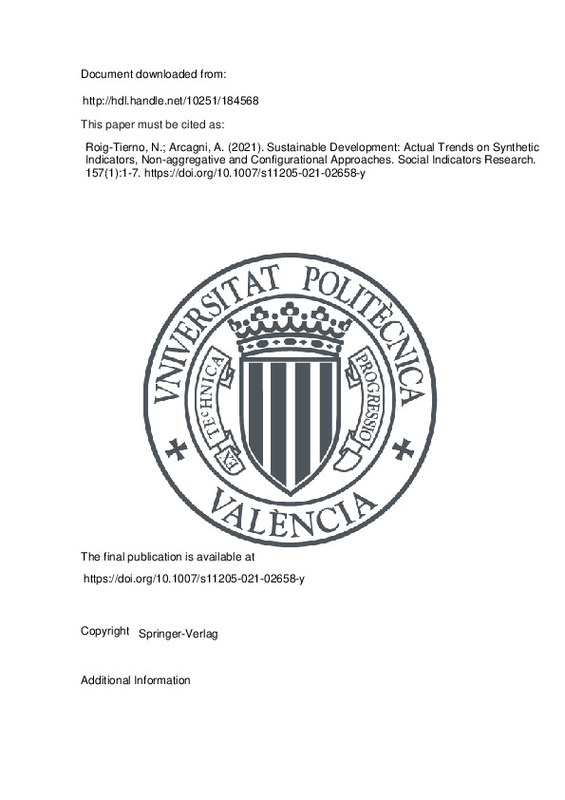JavaScript is disabled for your browser. Some features of this site may not work without it.
Buscar en RiuNet
Listar
Mi cuenta
Estadísticas
Ayuda RiuNet
Admin. UPV
Sustainable Development: Actual Trends on Synthetic Indicators, Non-aggregative and Configurational Approaches
Mostrar el registro sencillo del ítem
Ficheros en el ítem
| dc.contributor.author | Roig-Tierno, Norat
|
es_ES |
| dc.contributor.author | Arcagni, Alberto
|
es_ES |
| dc.date.accessioned | 2022-07-20T18:05:56Z | |
| dc.date.available | 2022-07-20T18:05:56Z | |
| dc.date.issued | 2021-08 | es_ES |
| dc.identifier.issn | 0303-8300 | es_ES |
| dc.identifier.uri | http://hdl.handle.net/10251/184568 | |
| dc.description.abstract | [EN] Sustainable development is key for the fundamental challenges of humanity. The use of non-aggregative approaches can be attractive when trying to understand the relationships of humanity with both nature and society. Qualitative Comparative Analysis (QCA) is a method that merges the advantages of qualitative and quantitative methodologies and identifies patterns of conditions that are necessary or sufficient for explaining an outcome. Partially ordered set (poset) theory is a branch of mathematics through which tools that allow dealing with multidimensional systems of ordinal data are obtained. Assessing well-being and development requires sharing a conceptual framework on its determinants, as well as on society, and needs from the identification of the most consistent and effective methodologies to build indicators that are easily understood by society. Sustainable development is an increasingly interesting issue whose academic development can be improved thank to the use of these methodologies, in its combination of environmental and socio-economic concerns. | es_ES |
| dc.language | Inglés | es_ES |
| dc.publisher | Springer-Verlag | es_ES |
| dc.relation.ispartof | Social Indicators Research | es_ES |
| dc.rights | Reserva de todos los derechos | es_ES |
| dc.subject | Sustainable development | es_ES |
| dc.subject | Qualitative comparative analysis (QCA) | es_ES |
| dc.subject | FsQCA | es_ES |
| dc.subject | Partially ordered set (poset) | es_ES |
| dc.subject.classification | ECONOMIA APLICADA | es_ES |
| dc.title | Sustainable Development: Actual Trends on Synthetic Indicators, Non-aggregative and Configurational Approaches | es_ES |
| dc.type | Artículo | es_ES |
| dc.identifier.doi | 10.1007/s11205-021-02658-y | es_ES |
| dc.rights.accessRights | Abierto | es_ES |
| dc.contributor.affiliation | Universitat Politècnica de València. Departamento de Economía y Ciencias Sociales - Departament d'Economia i Ciències Socials | es_ES |
| dc.description.bibliographicCitation | Roig-Tierno, N.; Arcagni, A. (2021). Sustainable Development: Actual Trends on Synthetic Indicators, Non-aggregative and Configurational Approaches. Social Indicators Research. 157(1):1-7. https://doi.org/10.1007/s11205-021-02658-y | es_ES |
| dc.description.accrualMethod | S | es_ES |
| dc.relation.publisherversion | https://doi.org/10.1007/s11205-021-02658-y | es_ES |
| dc.description.upvformatpinicio | 1 | es_ES |
| dc.description.upvformatpfin | 7 | es_ES |
| dc.type.version | info:eu-repo/semantics/publishedVersion | es_ES |
| dc.description.volume | 157 | es_ES |
| dc.description.issue | 1 | es_ES |
| dc.relation.pasarela | S\433973 | es_ES |
| dc.description.references | Davey, B. A., & Priestley, H. A. (2002). Introduction to lattices and order. Cambridge University Press. | es_ES |
| dc.description.references | Fattore, M. (2016). Partially ordered sets and the measurement of multidimensional ordinal deprivation. Social Indicators Research, 128(2), 835–858. | es_ES |
| dc.description.references | Garcia-Alvarez-Coque, J. M., Mas-Verdú, F., & Roig-Tierno, N. (2021). Life below excellence: exploring the links between top-ranked universities and regional competitiveness. Studies in Higher Education, 46(2), 369–384. | es_ES |
| dc.description.references | Nieto-Aleman, P. A., Garcia-Alvarez-Coque, J. M., Roig-Tierno, N., & Mas-Verdú, F. (2019). Factors of regional poverty reduction in Colombia: Do institutional conditions matter? Social Policy & Administration, 53(7), 1045–1063. | es_ES |
| dc.description.references | Ragin, C. C. (2000). Fuzzy-set social science. University of Chicago Press. | es_ES |
| dc.description.references | Ragin, C. C. (2009). Redesigning social inquiry: Fuzzy sets and beyond. University of Chicago Press. | es_ES |
| dc.description.references | Ragin, C. C. (2014). The comparative method: Moving beyond qualitative and quantitative strategies. University of California Press. | es_ES |
| dc.description.references | Sarin, S., Haon, C., Belkhouja, M., Mas-Tur, A., Roig-Tierno, N., Sego, T., Porte, A., Merigó, J., & Carley, S. (2020). Uncovering the knowledge flows and intellectual structures of research in technological forecasting and social change: A journey through history. Technological Forecasting and Social Change, 160, 120210. | es_ES |
| dc.description.references | Schneider, C. Q., & Wagemann, C. (2012). Set-theoretic methods for the social sciences: A guide to qualitative comparative analysis. Cambridge University Press. | es_ES |
| dc.description.references | United nations sustainable development – 17 goals to transform our world. (2021). Retrieved February 12, 2021, from https://www.un.org/sustainabledevelopment | es_ES |







![[Cerrado]](/themes/UPV/images/candado.png)

